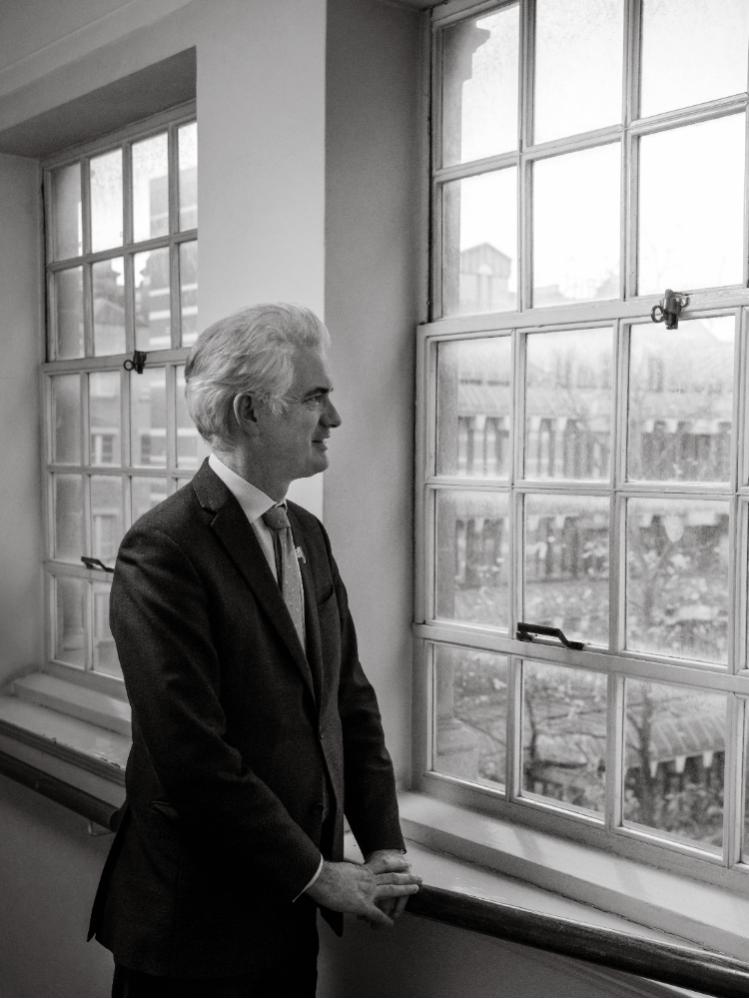James Cartlidge: 'Defence should be the number-one priority'
James Cartlidge (Photography: Louise Haywood-Schiefer)
9 min read
With Europe racing to procure arms against the threat of widespread war on the continent, shadow defence secretary James Cartlidge tells Sophie Church the UK risks falling behind. Photography by Louise Haywood-Schiefer
“I’d say when Russia is rattling the sabre as it is, defence should be the number-one priority.”
With widespread war on the continent seemingly creeping closer, shadow defence secretary James Cartlidge says investing in defence should be our main concern. But the UK is falling behind in the race to rearm, he argues, because it is dragging its heels over completing a strategic defence review (SDR), which will set out the roadmap for reaching its target of spending 2.5 per cent of GDP on defence.
“It’s extraordinary that whenever we ask a question in the Chamber, the answer is: ‘We’ll wait for the strategic defence review,’” he says. “My view is: don’t wait for the SDR to order our new munitions, because all that will happen is, we’ll still find we need them, and we’ll be even further behind in the queue. There’s huge international demand for armaments because of the threat levels, and therefore you have to get in and place your order.”
 James Cartlidge (Photography: Louise Haywood-Schiefer)
James Cartlidge (Photography: Louise Haywood-Schiefer)
He adds: “I cannot stress enough the urgency of having a funded plan in order that we can restock our munitions.”
Cartlidge asserts that, instead of fast-tracking the process, the government has frozen procurement of defence equipment for the rest of this financial year. On raising this in the Chamber, Defence Secretary John Healey did not deny the claim, replying instead that the government is “putting in place a grip on the out-of-control spending that the last government left”.
The Times has reported that the government instructed its procurement body to “tighten” orders of weapons and arms for the rest of the financial year. A Ministry of Defence (MoD) spokesperson later told The House the allegation of a total freeze “isn’t true”. This does not rule out the possibility orders being tightened significantly.
According to Cartlidge, the government’s stalling “clashes with the idea of moving urgently” against the tangible threats the UK is already facing. He points to the conflict in the Red Sea – where the Iran-backed Houthis are directly threatening British ships – to show that war is already at our doorstep.
It was very difficult to defend the charge the accommodation wasn’t good enough, because it isn’t good enough
“This was our own Navy with our own personnel potentially at risk,” says the 50-year-old Conservative MP for South Suffolk. “To me, the reason they should have gone early on 2.5 per cent is because it would fire up the defence industry and enable them to procure at pace and scale the munitions we need, like anti-ballistic missile air defence for the Navy.”
He continues: “From my experience in the MoD, if you just announced one year here, one year there, you cannot give the department the security to place those orders. The spending profile we announced to 2030 would not have fixed all the problems in the MoD, but it would have meant we could place the level of orders we need to for our munitions.”
Since the war in Ukraine began, the UK has pledged £7.8bn worth of military assistance to Ukraine in its fight against Russia, providing tanks, air defence systems and long-range precision strike missiles. Hovering his hand a foot from the floor, Cartlidge says “that’s about the level” of the UK’s remaining stockpile of weapons.
Can he say how many we actually have left?
“That is absolutely classified information, the actual numbers, but you don’t have to be an expert to assume – reportedly we’ve given another batch of Storm Shadow to Ukraine – that our own stocks therefore have gone down a fair bit.”
While the Conservatives are pushing to procure, the government has just announced it will save £500m by decommissioning old military equipment. This includes two amphibious assault ships, a frigate, 14 Chinook helicopters, 17 Puma helicopters and our Watchkeeper drone programme.
With drones proving so important in Ukraine’s fight against Russia, does Cartlidge trust Labour to replace Watchkeeper?
“They’ve implied that they are in the things they’ve said,” he replies. This is “certainly something” he will be questioning ministers on.
The shadow defence secretary adds that he did not oppose the decision to scrap Watchkeeper because it is a “relatively old programme in an area of uncrewed systems”, where countries have to be “so cutting-edge just to compete because of the way warfare is changing”.
With stocks so low, and a tightening of new procurement in place, Cartlidge urges the government to consider working with allies to boost our equipment reserves.
“Germany possesses several hundred Taurus missiles. It was reported in October they were buying another 600. As I understand it, the Taurus can be fired from a Typhoon [fighter aircraft]. We possess Typhoon fighters.”
Given Germany “appears reluctant to give Taurus directly to Ukraine”, Cartlidge suggests an option we should be “exploring urgently” is for Germany to backfill the UK’s stocks with Taurus missiles: “We could use it for our own armed forces on the Typhoon to make up for the fact that we’d given Storm Shadows to Ukraine.”
I cannot stress enough the urgency of having a funded plan in order that we can restock our munitions
As defence procurement minister under the last government, Cartlidge was a strong advocate for joint procurement drives across Europe. Today, he says “the biggest thing we could do that is not about actual military competition” would be “Europe coming together to boost its military spending levels”, and “using that to place massive procurement orders so that we scale up our military industrial capacity”.
Cartlidge approves of Labour’s thinking here, revealing that the government is pursuing joint procurement initiatives with Nato partners.
“They recently confirmed to me they are considering joint procurement for two areas, which is LMM [Lightweight Multirole Missile], which is made in Northern Ireland, and ASRAAM [Advanced Short Range Air-to-Air Missile], which is [produced by] MBDA. I think that’s good.”
With Donald Trump claiming to be able to end the war in Ukraine in one day, does Cartlidge think Republicans are right to tell Ukraine to be realistic about the settlement it can expect?
“Ukraine, having been invaded and having lost so much, is entitled to take its own view of how to approach any negotiations and how to prosecute war,” he says. “For the time being, we have to focus on doing what we can to support Ukraine, and hope that the US will continue to be very strong in that regard as well.”
While the Conservatives had been pursuing partnerships in the Indo-Pacific region – through defensive pacts with Japan, Australia and South Korea, for example – a wider conflict in Europe may see the UK struggle to provide support to Taiwan should China invade.
Cartlidge does not “necessarily accept” that we will be powerless to assist Taiwan in this scenario. However, he suggests the UK could indirectly support Taiwan through co-operation with the US: “The UK has a role, which is to help lead European Nato so that we can assist the US in turn, and ensure that they are able to maximise their efforts in other parts of the world.”
The shadow defence secretary is clearly proud of the Conservative Party’s actions to position the UK as a strong Nato ally, noting that former defence secretary Ben Wallace “took a decision to provide anti-tank weapons and other munitions in advance of the [Russian] invasion, which of course became public some months later”.
“That is an extraordinary decision, which no other European country would have made, which the EU could not have made, and which, of course, Nato could not have made, because Ukraine was not a Nato country. So, a very brave, bold decision, but without which I think Ukraine could have been conquered early.”
 James Cartlidge (Photography: Louise Haywood-Schiefer)
James Cartlidge (Photography: Louise Haywood-Schiefer)
Cartlidge is less inclined to admit the Conservatives made mistakes on defence when in government, however, saying instead there were “challenges which, in a way, were the result of other things we got right”.
“A big challenge for the military has been people leaving the armed forces. Retention has been a huge problem, but that, in a way, reflects the fact that we’ve had a very strong labour market with lots of vacancies,” he says.
Armed forces accommodation also presented another “challenge” for the Conservatives. Before being elected in 2015, Cartlidge founded shared ownership property portal Share to Buy Ltd, where he “did a lot of work with housing associations and regeneration”.
Today, he tells The House: “I always found, as the minister for the defence estate when I was at the MoD, it was very difficult to defend the charge the accommodation wasn’t good enough, because it isn’t good enough.”
With reports of armed forces housing riddled with pest infestations, mould and damp, does he think his party, in government for 14 years, should take some responsibility?
“Given the location of much of our defence estate, you’re always going to have some issues,” he replies. “I do think the fundamental point is that the service family accommodation – the houses – are just fundamentally not built for modern conditions. So, not surprisingly, you get all these problems.
“The number-one has been damp and mould, and that reflects the design of these houses. In an ideal world, you’d knock the whole lot down and rebuild again. That just isn’t possible or achievable. But I do think there’s more we can do.”
Cartlidge also agrees on the need for further investment in our nuclear weapons infrastructure, described as “dangerously rotting” by former Boris Johnson adviser Dominic Cummings.
“The challenge we have is the infrastructure that the deterrent relies on, the docking – this needs investment. It needs significant investment,” he says. “There’s a lot of debate on things like: do we need an Iron Dome? What we mustn’t do is overlook the fundamental part of our defence, which is the nuclear deterrent.”
With the threat of a world war seeming to loom larger by the day, does Cartlidge think the public should seriously consider it a possibility?
“No,” he says reflectively. “I do think we need to think as a society: how can we be more war-ready? But ultimately, in a country where you have a volunteer military, not conscription, and where it is very well-funded, and where you have a nuclear deterrent, really the number-one buck stops with the Secretary of State – ensuring urgency is being shown within the Ministry of Defence itself.”
